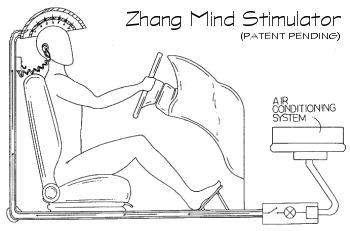The recent heat wave -- besides possibly increasing cephalopod-related homicide rates -- has an unfortunate mental side effect: decreased thinking abilities.
As with a computer's CPU, heat is a limiting factor on brain operations. A thinking brain produces heat, and too much or too strenuous thinking can lead to hyperthermia and potential brain damage. Outside the influence of mind-expanding drugs, the brain doesn't normally allow itself to reach that point, instead regulating thought processes to keep out of the danger zone.
Excess brain heat is dissipated via the environment, but when environmental temperatures rise this process becomes less efficient, forcing the brain to decrease metabolic neural activity to below acceptable standards. This manifests as sluggish or fragmented thought processes, mental instability, and general sleepiness.
There are ways to overcome this problem. A well-documented side-effect of the AFDB -- which I noted in my book -- is that it works like a heat-sink to cool the brain, especially when additional fins are sculpted into the foil. But passive heat dissipation will only get you so far in a highly entropic brain-environment system. When it gets really hot, serious thinkers turn to active cooling systems.
For example, Qi Zhang of Newport Beach, CA has applied for a patent on one such active cooling solution, aimed at motorists, that he calls the Mind Stimulator:

Zhang Mind Stimulator in preferred motorvehicular usage.
A mind stimulator includes a head cooler, a supporting frame for adjustably supporting the head cooler above a user's head, and a cooling source, which is communicatively connected with the head cooler, adapted for transferring a cooling air through the head cooler around the user's head so as to substantially cool down a user's head temperature. Therefore, by lowering the user's head temperature, the user's mind activities are substantially increased, so as to prevent the user returning back to the drowsy condition.
(He also envisions an alternate portable version on castors that can be wheeled around behind an office chair while at work.)
But what about when it isn't hot out? If cooling a brain in a hot environment can increase its level of activity to normal, can cooling a brain in a cool environment, or below normal operating temperature, produce faster, harder thinking, allowing the chilled thinker to outthink the room-temperature competition -- in other words, can one overclock the brain? Undoubtedly.
In fact, some theorize that the brain can be cooled to a point where it achieves a state of superconsciousness. Much like with superconductivity, superconsciousness allows thoughts to flow through the neurons with no resistance, making superconscious thought undetectable to brain scans and completely immune to mind-control.
Perhaps cryogenically stored heads are thinking in ways our overheated minds cannot fathom?
